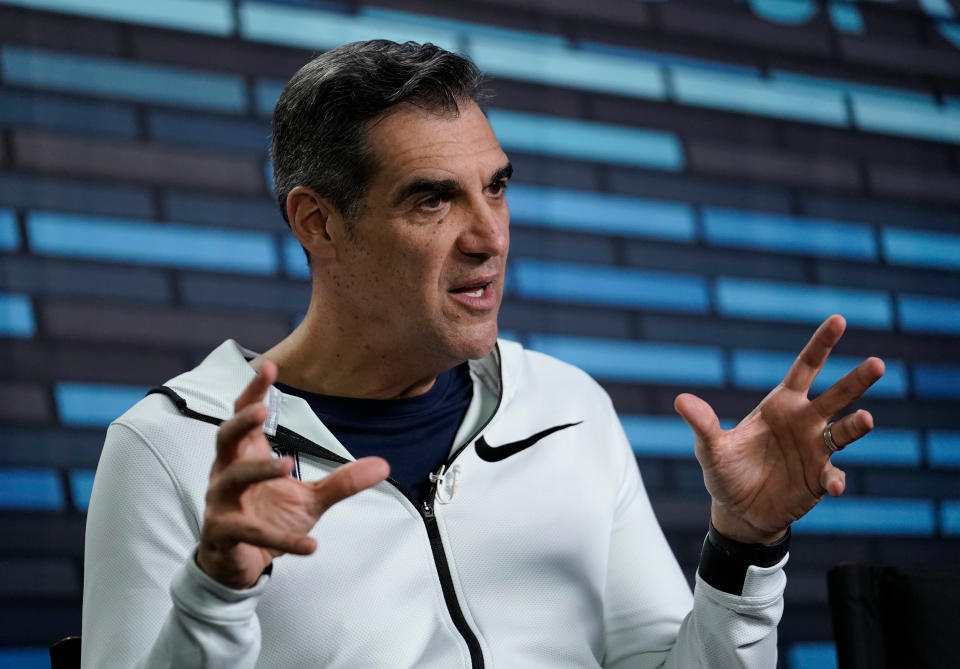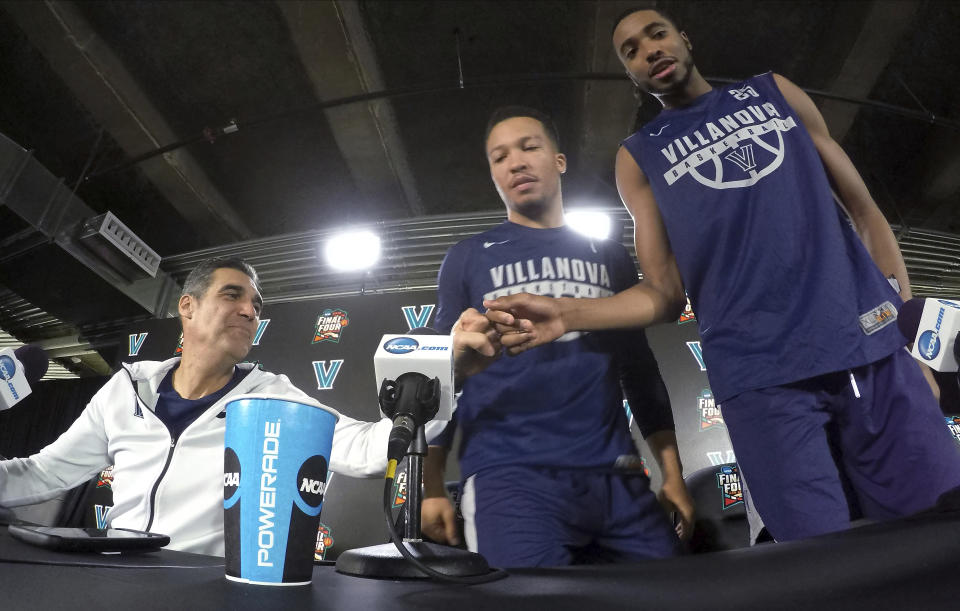How Jay Wright made himself – and Villanova – the class of college hoops
SAN ANTONIO – As the losses piled up for the young coaching staff at Hofstra in the mid-1990s, the gallows humor began. If they got fired, they would open a bait-and-tackle shop on the Jersey Shore. They’d call it Buster’s.
After three years on the job, the head coach’s record was 31-51. A fourth-consecutive losing season might have turned the current boss of college basketball, Jay Wright, into America’s most debonair bait salesman.
“The Jay Wright stock wasn’t ranked anywhere near where it is now,” said his old Hofstra assistant and potential tackle-shop co-owner, Tom Pecora. “He’s Fortune 500 now. But back then, we were selling futures, man. There wasn’t any history to sell.”
Wright will attempt to make history Monday night, when his solidly favored Villanova team meets Michigan in the NCAA tournament championship game. If the Wildcats win, it will be their second title in three seasons — something only seven other schools have accomplished, just one of them (Florida) in the 21st century.
North Carolina has never won two out of three. Neither has Indiana or Kansas. Villanova, nascent blueblood, might.
Yet the struggle was real for Wright in the early years. A guy who never seems to sweat was perspiring plenty in his first head-coaching job, just trying to keep his head above water and get Hofstra’s record above .500.

Here at the Final Four, a day after his team smashed all kinds of 3-point shooting records while demolishing Kansas on Saturday night, the 56-year-old Wright reminisced about the humbling start of what is becoming an all-time great career. Specifically, he recalled a home recruiting visit in Queens, New York, with Pecora.
They made their pitch to the recruit, and it seemed to go well. “I thought I put on a great show,” Wright said.
He asked if the family had any questions, and the player’s mom spoke up: Another coach who had made a home visit earlier told them Wright was going to be fired at the end of the upcoming season. He assured the family that was not the case.
“So I came out of the visit, I said to Tom Pecora, ‘Can you believe someone would say that? How could another coach say that?’ ” Wright said.
Pecora’s response: “Jay, we’ve lost three straight years. We might get fired.”
In 1994-95, Wright inherited a declining Hofstra program and promptly started his head-coaching career 2-14. It only got marginally better over the next 2 1/2 years. There wasn’t much reason to believe Jay Wright was Mr. Right.
“At that point in my fourth year I started thinking this could be it,” he said. “I really did. I would be lying to you if I said I wasn’t talking to my wife about plans about what else we would do. … It was year four, man. It wasn’t pretty.”
If not bait and tackle, a more realistic second act might have been a job in sales. Or an assistant coaching position in the NBA. Wright was weighing his options.
A tiny guard named Speedy Claxton eventually changed the trajectory of the program, and the victories began piling up for Wright. By 2001, he had taken Hofstra to consecutive NCAA tournaments and became the logical hire at a place where he once worked under Rollie Massimino, Villanova.
(Wright’s work at that time also caught the attention of Louisville athletic director Tom Jurich. If Jurich’s deal to land Rick Pitino that same spring had fallen through — which seemed possible when Michigan entered the picture — Wright was the likely fallback candidate. No telling how different college basketball would have been if the dominoes had fallen that way.)
Just as was the case at Hofstra, Wright was not an overnight success at ‘Nova. His first three teams all failed to make the NCAA tournament, and once again Wright entered a fourth season at a school feeling some pressure.
That’s when his breakthrough team came together. Randy Foye, Alan Ray and Kyle Lowry led a fearless four-guard lineup that came about by injury-induced necessity but actually presaged much of what we see today in basketball — open spacing, daring drives and perimeter shots in bulk.
Villanova’s small-ball teams of 2004-05 and 2005-06 won a combined 54 games and both advanced to the second weekend of the NCAA tournament. That secured Wright’s standing at the school. Yet even then, the ascendance to true power-program status involved some trial and error.
As Villanova’s stature grew, so did its ability to recruit at the highest level. But not all superstars are cut out for Wright’s style, which puts a premium on upperclassmen and a selfless offensive philosophy. His 2010-11 team had five McDonald’s All-Americans on the roster, but it fell apart after a 16-1 start — ‘Nova went 5-11 the rest of the way. The following year was worse, a 13-19 bust that remains the most losses for a Wright-coached team.

That’s when Wright rolled up his monogrammed sleeves and reinvented his recruiting philosophy: He would spend less time chasing five-stars who were marginally invested in the college experience, and more time selecting players who fit his ideal program culture.
What’s happened since then has shot Wright to the top of his profession. Veteran teams, built by layer upon layer of player development, produced four straight Big East titles from 2014-17. And the past four seasons have simply been the best in program history — a 135-16 record, three No. 1 NCAA tournament seeds, two Final Fours, and possibly two national titles. Villanova’s unspectacular recruiting class rankings over the last five years are the most worthless stats in the sport.
“It’s not perfect all the time, but we’re honest with guys when they come in,” Wright said. “They know the upperclassmen in our program are respected. They know that they’re going to have to earn their playing time. And the guys that choose Villanova usually want that. They want the competitiveness to prove themselves. They want to be part of something bigger than themselves.”
Villanova basketball is 40 minutes from being the biggest thing in the sport. No program in college basketball history has won more than the Wildcats’ 135 games in a four-year span. Mike Krzyzewski and Roy Williams have never had four straight 30-win seasons. Wright has, with no end in sight.
‘Nova will almost assuredly lose star juniors Jalen Brunson and Mikal Bridges to the NBA, but four other key players return and will be joined by a very good recruiting class. It’s unrealistic to expect 30-win seasons in perpetuity, but the building blocks for annual success are more sturdy at a place that does it Villanova’s way than the one-and-done trade schools that have to reinvent their rosters annually.
It’s his sport right now. Everyone else can line up behind Wright.
“I knew him when he was buying his suits off the rack,” Pecora said. “He looks like a movie star, but he’s genuine. People underestimate him, what he’s all about. I said all the time, ‘Underestimate him at your own peril.’ ”
Twenty-plus years ago, when that young staff was simply trying to keep the paychecks coming at Hofstra, predicting future coaching stardom for Jay Wright would have seemed like a wild overestimation. But he’s pulled it off, and then some. The bait-shop fallback career isn’t happening.
More from Yahoo Sports:
• Reporter fractures eye socket after being struck with foul ball
• Giants’ Panik makes baseball history vs. Dodgers
• Notre Dame’s stunner vs. UConn may be best game ever
• Yankees’ Judge ties mark as MLB’s tallest center fielder

